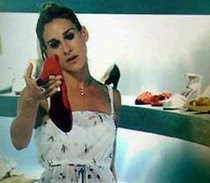
As reported in my Latest News column on 19th Feb, water rates are due to rise by 4.1%so I thought it best to give you a run down on how to save money and not use water excessively.
First up, after doing some research I found a list of approx prices for water usage, it may seem cheap, initially, but it all adds up when you think about how many times you flush the loo or fill the kettle in a week!
18p Cost of a bath using 80 litres of water (this and all figures from Ofwat)
8p-9p Cost of taking a shower (35 to 40 litres of water)
2p Cost of spending a penny - a standard flush uses between 7½ and 9½ litres of water
4p Cost of using a dishwasher (20 litres of water)
£1.19 Cost of watering a typical garden (one hour of hosepipe watering uses 540 litres of water)
Simple saver
If you've got more bedrooms in your house than people living there, a water meter that bases your bill on how much you use rather than on your home's rateable value could save you as much as £200 a year. According to Ofwat, about a third of households in England and Wales already have a water meter installed, and this is expected to rise to 35% by March next year. Call your water company to find out if a meter will suit you - it will fit it for free. Note that, as a general rule, a big family means that you'll probably be better off sticking with the water rates until you have to switch. I have a water meter and have recently gone from 6 to 5 in our household but my water rates are for six months what the national average is for a year!
Now for the money saving tips!
1. Old toilet cisterns can use as much as nine litres of clean water every flush. Reduce this by placing a "hippo" in the cistern, says the Environment Agency. These plastic devices, available from most water providers, displace the water and prevent so much being used. You could save up to three litres of water every time you flush with the right water saving device.
2. Mend dripping taps immediately; you can waste up to 140 litres a week via drips.
3. Use the minimum amount of water required for kettles or for boiling in saucepans, and save both water and energy.
4. Don't switch on dishwashers or washing machines until you've got a full load.
5. You can waste five litres of water a minute if you leave the tap running while you brush your teeth, shave or wash your hands - so turn it off.
6. Washing your car? Ditch the hosepipe for buckets of water.
7. Put a water butt in your garden to collect rainwater that can be used for watering your lawn and plants. And if you let the lawn grow a little longer, not only will you be reducing the amount of mowing you do (saving power, too), it will actually need less watering than a close-shaven patch of grass. Don't forget to add mulch to your flower and veg beds, too - you'll be preventing the weeds growing as well as helping the soil conserve moisture, so you'll need to splash the hose around less on the beds.
8. If you drink tap water or use it for squash, don't run tap until it is really cold, instead keep a jug of water in the fridge.
9. Bath small children together and then top up with more hot, bubbles etc for you to get in after!
If things get really tough and you find you can't pay the bill:-
Find out if you're entitled to financial help
Low-income households - those on benefits such as Job Seekers' Allowance or Income support - can get financial help from their water company in the shape of the "Water Direct" scheme which caps bills. You may also be able to pay your water rates weekly or monthly with a payment card you can use at any paypoint or post office.


No comments:
Post a Comment